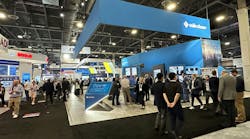As security technicians and installers live the majority of their life on the road and in the field, it is vital to have the essential tools and cost-effective solutions to make the installation procedures faster and smoother. For the New York Merchants Protective Company (NYMPC), an installation company and monitoring center operations in Freeport, N.Y., the focus was to eliminate wasted technician time. Finding the right system to do just that was the difficult part.
Covering a wide area, the NYMPC technicians would take home a company vehicle to be able to start their day from home rather then traveling to the office just to pick up calls or messages. Fax machines allowed NYMPC to send a technician his initial call sheet, but the technicians were still finding that they were picking up additional calls or schedule changes over a two-way radio or cell phone throughout the day. Calls were recorded on service tickets and faxed back to the office at the end of the day. During the day the technicians would give the service dispatchers call dispositions and parts requests. Charges would be put on an account and be confirmed when the signed service ticket was either faxed back or physically returned to the office.
The problem that NYMPC was finding with this system was wasted dispatcher time; talking to technicians for dispositions, parts and schedule changes. Very often parts orders, go-back calls and service call charges got lost in translation. A better system was clearly needed for NYMPC to improve customer service, reduce operating costs and increase profitability and revenues.
Cutting the losses With a new focus on finding a more efficient system that would manage technicians time better, NYMPC set out to find a solution that addressed and/or the following problems:- Frequent returns to the office to obtain/resolve calls.
- Additional time spent communicating with the service dispatchers.
- Need for detailed dispositions for each call.
- Inability of technician to see previous call history to check for failure patterns.
- Ordering incorrect replacement parts.
- Inefficient means of maintaining vehicle inventory.
- Inability to capture customer signature.
- Continued loss of paperwork.
- Lack of way to dynamically reschedule appointments.
- No scheduling board to display calls and job status in real time.
- Inability to look up product documentation online.
Having previously experimented by using hand-held computers, tablets and various other methods of automating the process, NYMPC was finding that each time the same disadvantages to implementation were present. The high cost of ruggedized hand-held devices made the return on investment (ROI) unacceptable when maintenance and replacement costs were considered. The size of the device also needed to be considered as well as communications costs. Asking a service technician to be personally responsible for such an expensive device also seemed unreasonable.
Step in the right direction--the future After an extensive search, Sedona Office provided the solution. A software solution released by Perennial Software, Inc., Chagrin Falls, Ohio, and specifically designed for the security industry, the platform uses an open architecture, allowing NYMPC to integrate it with their automation system. The Sedona Field Service Unit (FSU), an add-on application to Sedona Office and Windows PC pocket application allows field technicians to process their work and communicate real-time from the field. For technicians at NYMPC, the device was a success and they were ready to begin the implementation of data terminals through their wireless carrier, eliminating costs spent using a handheld device.The real-time two-way communication of data available with the Sedona FSU will not only impact the service technician’s productivity and accountability, but also improve customer relations and the company’s profitability, according to Michael Marks, president of Perennial Software.
From the technician’s perspective the system is very easy to use. At the start of each day, and after changes in status the technician re-syncs his device. Then, the mechanics list of calls is presented. When the call is selected the account info is presented, allowing the technician to view details about the call prior to accepting the assignment. Once the technician places changes in status to dispatched, the record in the service department is updated and again upon arrival. This progression keeps an extremely tight timeline on travel and on site times for each call.
On site the tech selects any parts necessary for the completion of his assignment. The system will automatically remove used parts from his vehicle inventory and flag parts that need to be replenished, thus eliminating return visits for parts that should be kept in rolling inventory. At the close of the ticket the system calculates all charges for time as labor, and parts as may be applicable. The customer’s signature and method of payment is electronically recorded.
When the information is sent back it is reviewed for quality control and the ticket is finalized. Once closed, billing all related information is transferred to the subscribers’ permanent record.
Why Sedona FSU? For NYMPC, the decision to move forward with a project like this was based upon returns versus costs. There are one time costs involved such as the management program itself, time and internal labor for data conversion, training of personnel and hardware. There are also recurring costs, for the software licenses and support, airtime charges for the hand-helds and maintenance of the hardware. On the positive side, NYMPC’s service department is now able to operate more efficiently with the reduced load of not dealing with the technicians on every call. Service tickets are no longer being lost or misfiled and service department’s revenue has increased substantially. The installers are actually getting more calls completed in a day because of both the visual scheduling element and tighter controls on the vehicle inventory. NYMPC’s cost per call decreased as well. The system increased customer satisfaction with the service department which should translate into higher customer retention rates.Mark Fischer, vice president and chief technology officer at New York Merchants Protective Co., Freeport, N.Y.

